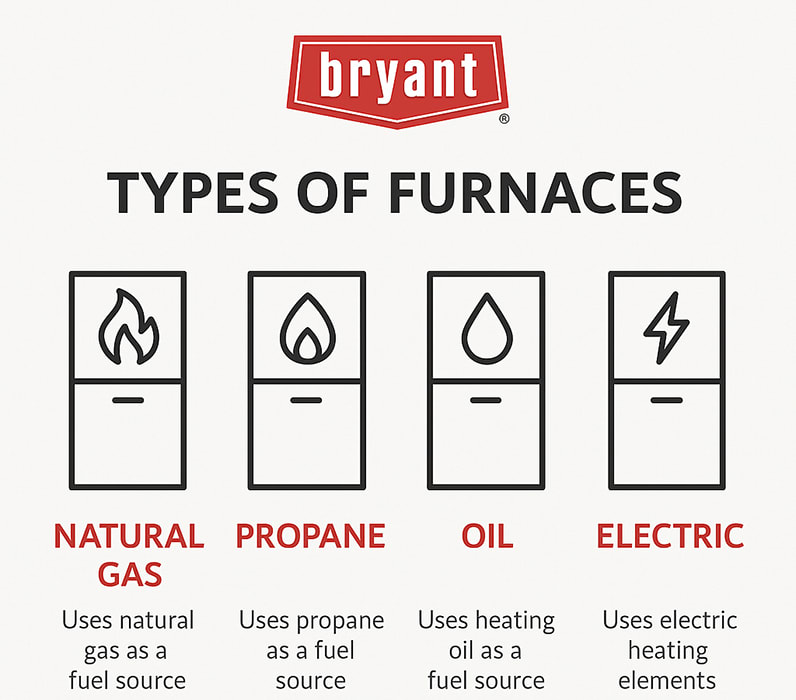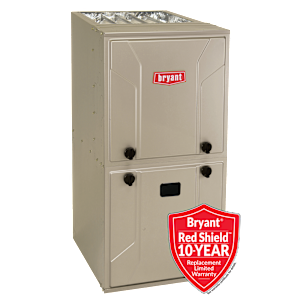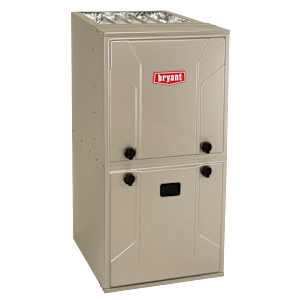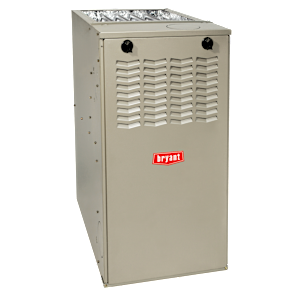About The Author: Travis Baugh is a Digital Brand Marketing Manager for Bryant, where he creates clear, helpful content to guide homeowners through heating, cooling, and indoor air quality decisions. His goal is to empower readers with the knowledge they need to choose the right comfort solutions for their home—confidently and comfortably.
Types of Furnaces: A Comprehensive Guide for Homeowners
Choosing the right heating solution for your home is crucial, and understanding the different types of furnaces can make a significant difference in your comfort and energy efficiency. This guide explores the various types of furnaces, their pros and cons, and critical factors to consider when selecting one.
Understanding Furnaces
Furnaces are central to home heating systems, tasked with generating and distributing heat throughout your living space. They function by heating air, water, or steam, which is then circulated via ductwork or pipes to maintain a comfortable indoor climate. Powered by energy sources such as natural gas, electricity, propane, and oil, furnaces offer varying efficiencies and performance levels. Learn more about what is a furnace.
Key components include the heat exchanger, blower motor, and thermostat. The heat exchanger transfers heat from combustion to air or water, the blower motor circulates heated air, and the thermostat allows you to set and control the temperature. Furnaces often integrate with air conditioners and heat pumps in forced-air systems, ensuring a warm and comfortable home during winter, and efficient cooling in summer.
Understanding furnace functionality and components is essential for homeowners considering upgrades or furnace replacement. Bryant offers a wide range of furnace solutions tailored to diverse heating needs, ensuring efficiency and reliability. Whether you seek a conventional gas furnace or a high efficiency furnace, Bryant has options suited to your comfort requirements.
Types of Furnaces

Various types of furnaces cater to different home heating needs. Popular types of furnaces include:
- Natural gas furnaces are known for their efficiency and cost-effectiveness, heating air quickly and providing consistent warmth. Modern models incorporate safety features and reduced emissions to boost their environmentally friendliness.
- Electric furnaces use electricity to generate heat. Ideal for homes without natural gas access, they provide reliable heating, although operational costs may be higher in some areas. Understand gas vs electric furnaces
- Oil furnaces burn heating oil and are mainly used in areas where oil is more accessible than gas. They effectively heat spaces but may incur higher fuel costs depending on the home’s region. Their ability to produce consistent heat makes them a viable heating option in colder climates
- Propane furnaces store propane in tanks, offering a practical choice for areas lacking natural gas access. Similar in efficiency and performance to gas models, they serve as a reliable heating source in colder months.
Choosing the right furnace type involves considering factors like location, budget, and heating needs. Bryant provides a range of solutions tailored to ensure your home remains warm and comfortable throughout winter.
Comparing Different Types of Furnaces
Understanding different types of furnaces is essential for making an informed decision. Each type has distinct efficiency ratings, cost considerations, environmental impacts, lifespan, and furnace maintenance needs.
Efficiency Ratings
Efficiency ratings indicate energy consumption relative to heat production. AFUE (Annual Fuel Utilization Efficiency) is used for all types of combustion-based furnaces, including natural gas furnaces, propane furnaces, and oil furnaces. AFUE measures how efficiently the furnace converts fuel into heat over a typical year, factoring in heat losses through exhaust and other inefficiencies—relevant only for fuel-burning systems. Many modern gas furnaces exceed 90% efficiency, helping make them cost-effective for utility-conscious homeowners. AFUE is not used for electric furnaces, because electric heating doesn't involve combustion and has virtually no flue losses—electric furnaces typically operate at or near 100% efficiency.
Environmental Impact
Environmental impact is vital when evaluating furnaces. Gas models emit fewer greenhouse gases than oil furnaces, positioning them as eco-friendlier. Electric furnaces offer a cleaner alternative, especially when powered by renewables. As sustainability becomes a priority, selecting a furnace aligning with environmental goals is crucial.Furnace Lifespan
While furnace type—whether gas, electric, oil, or propane—can influence performance and installation requirements, it typically doesn't have a major impact on overall lifespan. Factors like regular maintenance, proper installation, usage patterns, and climate conditions play a much larger role in determining how long a furnace will last. With proper care, most furnaces can operate efficiently for 15–20 years, regardless of fuel type.
In conclusion, weighing efficiency ratings, fuel availability, environmental impact, and lifespan is vital to select the best furnace for your home, considering budget and environmental goals.
Factors to Consider When Choosing a Furnace
Selecting the right furnace involves evaluating key factors impacting comfort and efficiency. Key factors include:
- Furnace size: A furnace too small struggles to heat adequately, causing discomfort, while an oversized unit cycles too frequently, wasting energy and increasing heating bills.
- Local climate: Regions with varying temperatures affect the type that works best. In colder areas, a high-efficiency furnace ensures warmth.
- Energy costs: Understanding local energy costs helps select a furnace fitting long-term budgeting goals, with high efficiency leading to savings over time.
- Budget, financing options, and rebates: Look for financing options making efficient units accessible without financial strain. Many Bryant dealers offers flexible financing plans, managing upfront costs while investing in reliable heating. Many high-efficiency furnaces qualify for local utility rebates as well.

Bryant Furnace Solutions
Bryant offers a wide range of furnace solutions tailored to diverse residential heating needs. Our lineup includes gas and oil models, ensuring homeowners find the ideal system for specific requirements.
With advanced engineering and innovative designs, Bryant furnaces deliver reliable warmth and enhance home comfort.
Bryant’s Evolution™ Series furnaces feature high energy efficiency, optimizing fuel consumption to reduce bills and minimize environmental impact. Models often exceed industry standards with high AFUE ratings, delivering exceptional performance without sacrificing comfort. Features like variable-speed blowers and modulating gas valves enable precise temperature control, maintaining consistent home comfort regardless of external weather. Precise gas modulation always delivers the right amount of heat for the greatest energy efficiency, while Perfect Heat™ technology means consistent comfort by adjusting system operation to changing conditions.
Perfect Humidity™ technology removes more moisture than a standard furnace during cooling operation (when installed with a matched air conditioner or heat pump), while Fan On Plus™ technology lets you choose between four speeds of continuous fan operation with a compatible control.
Connect With A Bryant Dealer On Types Of Furnaces
Choosing Bryant furnace solutions means investing in reliability, efficiency, and exceptional furnace service. Connect with a Bryant dealer to get expert guidance on choosing the furnace type that best fits your home, climate, and energy preferences. Whether you're considering gas, electric, oil, or propane, a Bryant professional can evaluate your specific needs and recommend the most efficient and cost-effective solution. Their experience ensures proper sizing, installation, and long-term performance. Schedule an appointment today.
Explore Bryant Furnaces
Choose a Bryant furnace for reliable, efficient heating that keeps your home comfortable throughout the winter. Known for their durability and advanced technology, Bryant furnaces offer quiet operation, precise temperature control, and energy-saving features like variable-speed motors and 2-stage heating. With a range of models to suit different home sizes and needs, Bryant furnaces are built to last and come with industry-leading warranties, providing peace of mind and long-term value for your home heating system.
Furnace Type FAQs
The three main types of furnaces are gas, electric, and oil, each using different fuel sources to heat your home.
High-efficiency gas furnaces are generally the most efficient, often reaching 90–98% AFUE (Annual Fuel Utilization Efficiency).
Most furnaces can accommodate a whole-home humidifier, but compatibility depends on the furnace type and duct system.
Gas furnaces are the most common in U.S. homes due to their efficiency and availability of natural gas.
Learn More About Furnaces
- Learn how much is a new furnace
- Discover what is a heat pump vs furnace
- Find out how long does a furnace last
- Learn about the importance of furnace cleaning
- Understand the ins and outs of a furnace tune-up
- Explore down flow furnaces





